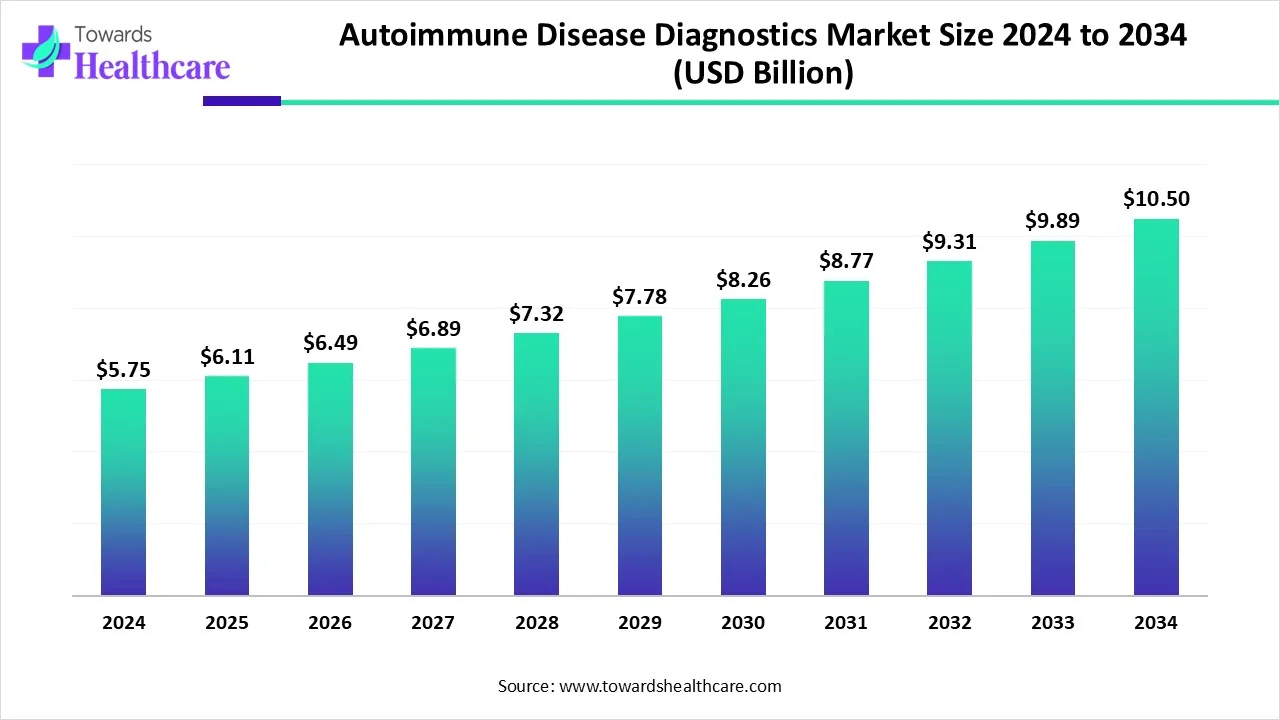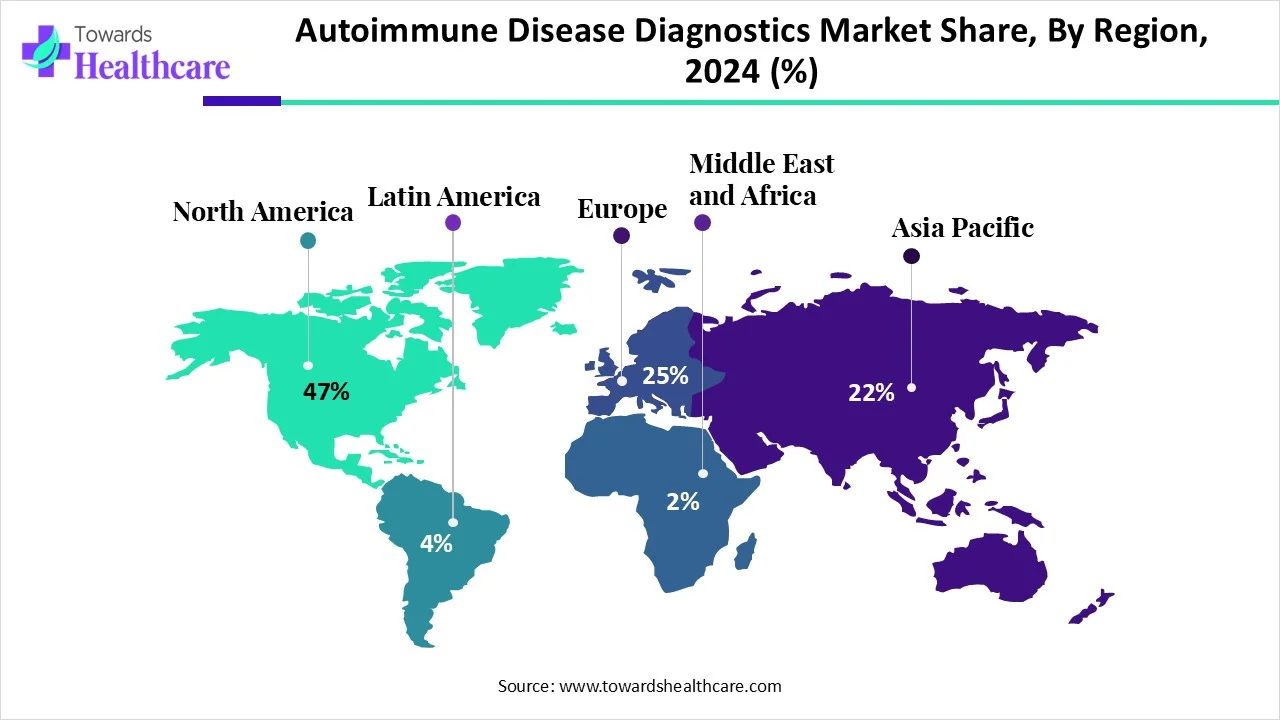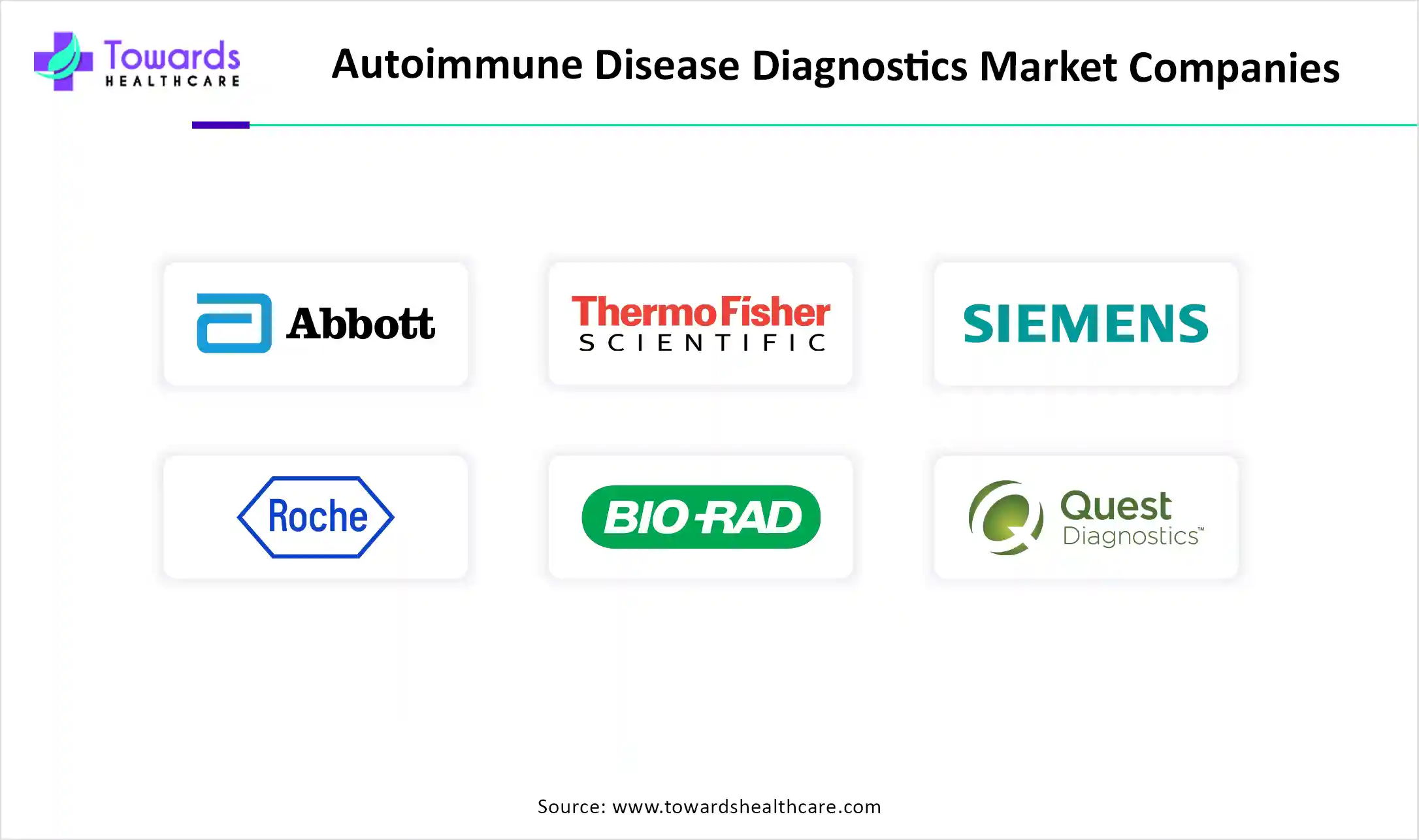January 2026

The global autoimmune disease diagnostics market size is calculated at USD 5.75 in 2024, grew to USD 6.11 billion in 2025, and is projected to reach around USD 10.5 billion by 2034. The market is expanding at a CAGR of 6.22% between 2025 and 2034.
The global autoimmune disease diagnostics market is driven by several factors, including increasing instances, rising awareness among patients and healthcare professionals, along with breakthroughs in novel technologies in molecular diagnostics, biomarker discovery, and personalized medicine are enhancing accuracy and efficiency in diagnosis. Moreover, the growing opportunities in the market are the development of groundbreaking biomarkers, molecular diagnostics and tests, evolving personalized medicine approaches, and the development of integrated digital health technologies.

| Metric | Details |
| Market Size in 2025 | USD 6.11 Billion |
| Projected Market Size in 2034 | USD 10.5 Billion |
| CAGR (2025 - 2034) | 6.22% |
| Leading Region | North America share by 47% |
| Market Segmentation | By Type, By Product, By Test Type, By End Use, By Region |
| Top Key Players | Abbott Laboratories, Thermo Fisher Scientific, Siemens AG, F. Hoffmann-La Roche Ltd, Bio-Rad Laboratories, Quest Diagnostics, Hologic, Danaher, Inova Diagnostics., EUROIMMUN Medizinische Labordiagnostika AG, Nova Diagnostics Pte Ltd., BIOMÉRIEUX, Hemagen Diagnostics, Inc. |
Autoimmune diseases are conditions in which the immune system of the body falsely attacks its healthy tissues and cells. Basically, diagnostics used in these diseases are involved in the identification and assessment of conditions. Globally, increasing the number of autoimmune cases, technological advancements, and growing awareness are impacting the growth of the autoimmune disease diagnostics market. Moreover, breakthroughs in technologies like nanotechnology and genomics are broadly supporting research in autoimmune diseases. These diagnostics are highly employed in the development of personalized medicine, anticipating disease progression, and drug discovery.
In the expansion of the market, AI has a major role as it assists in the analysis of a huge volume of datasets to detect patterns and robust markers, supporting prior detection and optimizing diagnostic accuracy. Also, its algorithms enable examination of medical images and clinical data, providing insights that might be skipped by conventional approaches, resulting in more timely and precise diagnoses.
For instance,
Growing Prevalence and Technological Advancements
Around the world, there is a rise in instances related to autoimmune diseases, such as rheumatoid arthritis, multiple sclerosis, and lupus, which require highly precise diagnostic tools are propelling the growth of the autoimmune disease diagnostics market. Moreover, consistent optimization in diagnostic technologies, like biomarker identification, genetic testing, and imaging modalities, is improving the efficiency and accuracy level in technological breakthroughs.
Limitations on Spending and Standardized Diagnostic Criteria
The challenges involved in the market growth are the rising expenses of specialized tests for autoimmune diseases, including those for antinuclear antibodies (ANAs) or specific autoantibodies, which are crucial, ultimately restricting access for patients and healthcare facilities. Although autoimmune diseases are complex, they show difficult symptoms, which raises the challenge of developing globally accepted diagnostic criteria.
Escalating Novel Technologies and Therapies
The autoimmune disease diagnostics market, experiencing many rising opportunities such as, "Omics" research (genomics, proteomics, metabolomics) which enables a complete understanding of the molecular alterations linked with autoimmune diseases, nanotechnology supports in drug delivery, targeting specific cells and tissues, and for designing new diagnostic tools, like biosensors. As well as therapies like synthetic receptor-based cell therapies, targeting and removing autoreactive cells in autoimmune diseases, are also proposing an innovative opportunity in the respective market.
By type, the localized segment held the major revenue share of the autoimmune disease diagnostics market in 2024. Primarily, this segment is driven by factors like accelerating cases of localized autoimmune diseases, technological developments, and boosting awareness about diseases and treatments as they enhance the accuracy and wider application in clinical settings.
By type, the systemic disorders segment is expected to grow fastest during the forecast period. The propelling factors, along with rising prevalences, are raised awareness in healthcare professionals and patients related to diseases that demand for as soon as possible diagnosis and intervention. However, the increasing adoption of personalized medicine processes and ongoing R&D address mechanisms results in innovative diagnostic and therapeutic strategies.
By product, the consumables & assays segment led the market in 2024, as the rising demand for specific assays and tests, including antinuclear antibody (ANA) tests and rheumatoid factor assays, is significantly fueling the market growth. Besides this, new emerging technologies such as multiplex assays and biosensors, and the expansion of clinical laboratories and diagnostic centers, require a higher count of diagnostic tests, which consequently results in the growth of the consumables and assays segment.
By product, the instruments segment is expected to grow fastest in the projected period. Around the world, the increasing demand for rapid, precise, and automated approaches is propelling the need for advanced instruments is a critical factor for the expansion of the segment. Also, these kinds of instruments assist in early-stage detection of autoimmune diseases, which enhances their adoption and patient outcomes.
By test type, the antinuclear antibody tests segment held the largest share is contributing to its dominance in the market. These tests are enabling early and accurate diagnosis, which is significantly driving the expansion of this segment in the autoimmune disease diagnostics market. Along with this, boosting technological breakthroughs of more sensitive and particular ANA test approaches, such as ELISA, IFA, and multiplex assays, optimizes the reliability and accuracy of diagnosis.
By test type, the autoantibody tests segment is expected to be the fastest-growing during the forecast period. Mainly, driven by the accelerating demand for accurate diagnosis and management of autoimmune conditions, diagnostic technologies developments, and the growing adoption of personalized medicine. This test assists in prior disease detection, tracking disease progression, and assessing the likelihood of developing specific autoimmune conditions.
By end use, the hospital segment dominated the autoimmune disease diagnostics market in 2024. As hospitals possess sophisticated resources and skilled professionals to cater to complex diagnostic methods, and provide specialized care for autoimmune diseases. As well as growing healthcare expenses, especially in developed regions, enable broader access to advanced diagnostic technologies, which are available in different hospitals.
By end use, the diagnostic centers segment is expected to grow at the fastest CAGR in the upcoming years. Majorly, these diagnostic centers allow innovative technologies such as biomarker identification, genetic testing, and imaging modalities, which optimize the accuracy and effectiveness of autoimmune disease detection. Nowadays, rising investments in the development of new centers, aimed at enhancing diagnostic capabilities and providing proper appointments, create chances for autoimmune disease diagnostics providers.

North America held the largest revenue share of the market share by 47% in 2024. Contributing factors are increasing instances, along with a broad hub for R&D in the respective sector, leading to the development of novel diagnostic tools and techniques, which enhance precise and efficient diagnosis. Also, they have a well-developed healthcare infrastructure, possessing advanced diagnostic provisions and a complex healthcare professional.
In the US, the rising population with awareness and education efforts has led to a higher recognition of autoimmune diseases, encouraging for early diagnosis and treatment in individuals. Also, the novel is increasing diagnostic tools and techniques, including molecular diagnostics, next-generation sequencing, and immunodiagnostics, which are boosting the accuracy and efficiency of autoimmune disease detection.
For instance,
The market is highly influenced by the increased expenditure on healthcare in Canada, like diagnostic testing, which is a vital factor in driving the market growth. Although initiatives by the government and their policies that support reimbursement for diagnostic tests for autoimmune diseases, which boost the application of diagnostics and ultimately result the market growth.
In ASAP, the autoimmune disease diagnostics market is driven by an accelerated population, with instances related to autoimmune diseases experiencing raised awareness among medical professionals about early detection of disease, and a well-established, rising healthcare infrastructure with sophisticated diagnostic facilities is expanding the market.
China has been facing a wide range of novel and accelerated advancements in diagnostic technologies like antinuclear antibody tests and autoantibody tests, which are highly utilized in rising prevalences of autoimmune conditions.
In India, a major population is focusing on the consumption of personalized medicine, which enhances the efficient outcomes with raised accuracy for individual characteristics. Over this, the market is experiencing significant growth due to a rising shift towards early diagnosis of diseases in the increasing instances, as well, with robust and rapid diagnostic tests.
For instance,
Europe is anticipating significant market growth impelled by the rising geriatric population linked with autoimmune diseases, which requires more accurate diagnostics for enhanced outcomes in the same. As well as, the European government is encouraging a focus on developed healthcare infrastructure and assisting R&D, which are playing a crucial role.
For instance,
The growing prevalence of raised awareness in patients is demanding advanced diagnostic tests, which is a major driver in the market expansion. Also, the increasing adoption of personalized medicine and technological advancements in the rising healthcare infrastructure are propelling the market growth.
The UK has been experiencing significant market growth, driven by the rising adoption of technological advancements like biomarker identification, genetic testing, and imaging modalities are expanding their market over the globe. Due to developments, patients are also taking steps towards early disease detection to improve the treatment for themselves.

By Type
By Product
By Test Type
By End Use
By Region
January 2026
December 2025
December 2025
December 2025